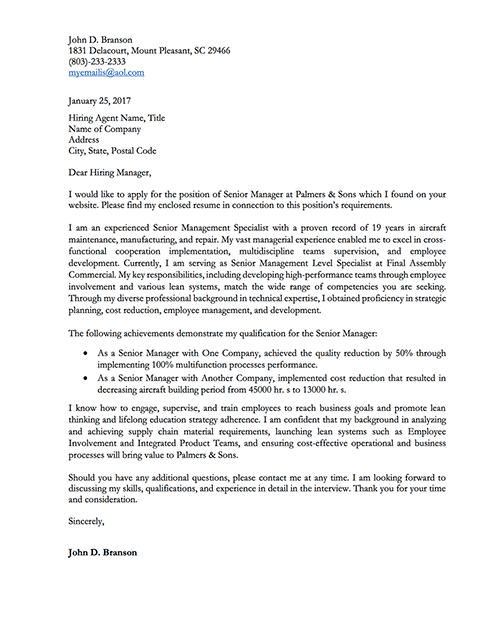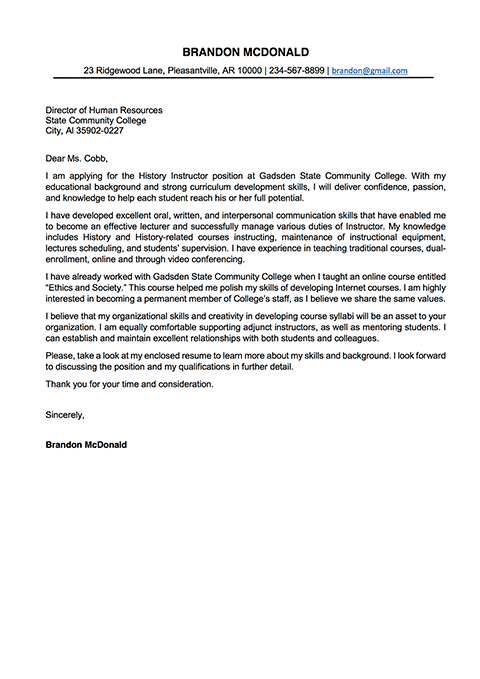Letter of Interest VS Cover Letter | The Diference
Have you ever heard about cover letters?
I am almost certain most of you have, but I doubt many of you are aware of a the lesser known ‘letter of interest’. In fact, even employers are often confused and misuse these two terms, leaving their job applicants in an even more perplexed state. We often receive the question, “Is the letter of interest same as cover letter?”, and the short answer is, no - they are two different documents.
In this article we will attempt to fill this gap in your knowledge and dispel any confusion you may have about the differences between a letter of interest and cover letter. With this new information, we hope that you are able to embark on a successful job search campaign.
What is a cover letter?
A cover letter is an essential part of the package that you send to a prospective employer in the hope of proceeding to the next stage of the application process (often an interview). In most cases, it accompanies a resume, a CV, and any other additional materials an employer may want you to submit. A cover letter serves as a “cover” for these documents as its name implies. Unless it is clearly stated as an instruction to not include a cover letter, it is highly advisable that every applicant writes one. It is unquestionably an incredibly important document in persuading a hiring manager that you are suitable for the position.
There are many good examples of cover letters online for everyone to use. Here is a good example of one.
The “must-have” content in your cover letter
In this document, it is essential to briefly introduce yourself, let the HR manager know what specific job offering has caught your eye, and provide necessary data about your corresponding skills and qualifications required for the position. At the end of the letter, you usually mention that any further information can be found in an attached resume. It is also customary to display your gratitude for their consideration, and that you look forward to their reply.
This is of course a very brief overview of what a cover letter is, for those who need to refresh their memory. Make sure you read our special detailed article if you wish to find out more.
What is a letter of interest?
If an applicant is looking to work for a certain company but is having difficulty finding any suitable and open job offerings, the letter of interest is the better option. This letter helps these job seekers figure out if there is a possibility of a job opening or not.
The letter of interest is a useful tool for students who wish to seek internship opportunities. Even if you are nowhere near graduation and are still in education, it is possible to send such a letter. The benefit of this is that you can move one step ahead of others - when all students graduate, the few who sent a letter of interest will already know if they are qualified for a particular job.
Active workers are advised to use a letter of interest to find better job alternatives for themselves rather than hastily changing workplaces without much thought. Think of it as a part of a surveillance operation that broadens your possibilities and opens new horizons for you as a professional.
Here is a good sample:
The “must-have” content in your letter of interest
First of all, it is crucial to include information regarding your motives to work with the prospective company. Then, you write about your relevant skills and experience - just like in a cover letter, but here you target a broad spectrum of possible job positions rather than a specific job. Here, you explain how the employer will be able benefit from your range of unique professional abilities and personal qualities. As usual, your contact information is also required, and we advise you to put it closer to the bottom of the page.
It is important to remember that although you may be unaware of the concrete job positions the company has to offer, you have to be very specific in explaining what you can and will do once they make a decision on the job opening. What about if there turns out to be no open offers? Well, you can tell them about all the positions in their field you are able to fit in and leverage your skills in. By doing this you can show them what an outstanding expert they are missing out on.

The difference: letter of interest vs. cover letter
So, what are the similarities and differences between these two documents?
Very simply, they both serve as a tool to reach the same goal: making an employer interested in you as a potential job applicant. Each one is usually addressed to a hiring manager in a particular company to showcase your qualities and to present yourself in a more personal way than with just submitting a resume. The main difference, however, is the objective of the writer. In a simple cover or application letter, you want to show our passion in obtaining a specific position that is already open and available for applicants, while in a letter of interest you are inquiring about a potential position that is not yet listed. This means you are ready to discuss any new proposals or openings their team has to offer. The “statement of interest vs cover letter” competition has only just begun.
What is the purpose of sending a letter of interest?
You may think that it is somewhat strange to send such a message without there actually being any public job openings advertised.
Now try to read the previous sentence one more time, and notice one key word: “public”.
When employers from a company do not speak openly about the lack of qualified specialists, it does not mean that there is no room for more. If your interest letter is impressive enough, you may easily land a job in at your preferred destination. A vacancy might just open up for you if you manage to convince the employer to do so. Long story short, you can set your goal, with a letter of interest, to work at a certain company rather than pursuing a particular job you want.
Moreover, by sending such a document, you are demonstrating to your potential employer your ability to take initiative. Even if you do not receive an instantaneous invitation to an interview, it is nevertheless the right attitude to have moving forward. Remember, if you make a brilliant first impression, they will remember your submission when your skills are needed in the future.

Content of the letters
As the functions of the two documents differ, so does the content. Recall, in a cover letter, you provide specific information to showcase your suitability to an employer, in the hope of acquiring the specific job on offer. In a letter of interest, you introduce your skills to your employer in a broad and less targeted fashion. This leaves you the possibility of matching to a range of jobs in the company.
The similarities in the texts include a list of your relevant skills, achievements, and experience. However, in the case of a cover letter, you select the facts that will fit the requirements of a certain job opening, while for a letter of interest, you select the facts that meet the expectations of all the staff in the company.
Subject of the letter and writing tips
There is a common misunderstanding that a letter of interest is more self-oriented than a cover letter because here you almost fully put the emphasis on yourself instead of focusing on a specific offering. Although mostly true, this statement is not entirely accurate. With no job openings on offer, your abilities will inevitably be the main topic of discussion.
To ensure that your text does not come off as narcissistic, use the letter as an expression of your enthusiasm for the organization that you plan to work for. Make the hiring manager feel your determination and desire to become a part of his or her team.
In addition, it is better to have a positive attitude when approaching a cover letter or letter of interest. If you are passionate about everything that has to do with the company, then congratulations - you are probably on the right path. The most successful candidates are those who are good at expressing their excitement about all the features of their desired job: qualified teammates, work ethics, traditions and values of the brand, corporate merchandising, and anything else you are able to imagine. Your attitude will no doubt reflect how your text is written. Later in the interview, you can say that it was your childhood dream to be a part of such a firm, that you always looked up to the founder of the organization, and other personal facts - only if they are true for you. Sincerity in writing will give you an advantage over others when applying or inquiring about a job.
Try not to overdo your praises for the company. This usually happens when the corporation is well-known and has a lot of capable applicants to choose from. The employer will not see your praises as being sincere, and will instead question your sincerity and motivation to join them. Make sure to maintain a balance between your artificial enthusiasm and honesty.
The next point is obvious, but still worth mentioning. You should be able to see how your skills and experience can actually fit in an area of the company you are applying for. For example, it is rather ridiculous for a game developer to send an inquiry to a cleaning company.
The difference between work fields in this example is intentionally exaggerated, but you get the point. When contacting multiple employers, try to investigate if they deal with any tasks related to your area of expertise.

Additional materials and formatting
While you can send a statement of interest without attaching any additional materials, it is absolutely impossible to do the same thing with a cover letter. A cover letter always accompanies, and draws the reader’s attention to your CV or resume.
Nevertheless, it is still better to attach your resume or CV to your letter of interest just in case the employer wishes to see it.
Both letters should be no longer than one page. Whether it is an interest letter or cover letter, do not forget to tailor it each time you send it to a different employer.
The format of your document also matters. Nowadays, most companies accept an electronic version of your document, but be prepared to print or fax your cover letter or letter of interest should an employer require it. If the hirer does not specify, either Microsoft Word (doc, docx) or PDF files are appropriate file formats to send.

Ask them for a favor
In a letter of interest, it is possible to ask a hiring manager to provide you some information about possible job openings, or even to directly propose to arrange an interview. In a cover letter however, you never ask for these things. Instead, it’s used as a tool for you to make a good impression so that the employer can remember you and consider you for the particular job on offer. From this point of view, a letter of interest is incredibly useful for job searching.
And here is why…
Have you heard about The Benjamin Franklin Effect?
It is claimed that if a person does something useful for you, their attitude towards you instantly improves. This is because we usually do not waste our time on people that we are indifferent to and do not affect us. That is exactly what happens in our situation – by asking for a small favor, you are positively propelled into the start of a progressive relationship.

Refer to them by their names
It is better to know the name of the person that is going to read your letter of interest (and your cover letter). Do not make the mistake of sending a document that starts with “Dear Hiring Manager”. This immediately shows the reader that you lacked the motivation to research more about the company and its employees. Just imagine yourself as the person who is responsible for the destiny of your applicants. What would your view on a person be if they did not know your name but still wanted something from you? Not great, is the answer. So, it is important to do your research beforehand.
Dear Mr. Smith
Dear Hiring Manager
Cover letter or letter of interest
A lot of people frequently ask the question: “Is a letter of interest the same as a cover letter?”. This lack of knowledge is usually due to the letter of interest being often considered a subcategory of a cover letter. Moreover, different sources will call the letter of interest by different names:
Here are some examples:
- Letter of interest
- Interest letter
- Cover letter of interest
- Letter of inquiry
- Letter of intent
- Prospecting letter
- Statement of interest
- Letter of request
It is interesting to note that career coaches and guide writers nowadays do everything they can to stand out and use new unorthodox words, which is why this list constantly get longer. At the same time, the final consumer (the applicant) often misunderstands and feels confused because of this, and even more so when a cover letter is used as a synonym to the letter of interest. However, with the help of this article, we hope you now have a greater understanding on some of the similarities, differences, and which to use in different contexts.
For example, if you see a publicly advertised job opening and embedded in the text is a request to include a “letter of interest” along with a resume or a CV, you now know that the advertiser made a mistake. Make sure you know to submit the right document – in this case what is really wanted is a cover letter with a CV attached. The statement of interest has no use when a vacancy is already promoted. Instead, its main function is to find out about possible offerings that are not on the surface for everyone to see.
Comparison chart: the difference between a cover letter and a letter of interest
| Letter of interest | Cover Letter |
|---|---|
| Has to be sent to a prospective employer in order to find out about the possibility of working in a company that has no current public job openings | Has to be sent to a prospective employer in order to get interviewed for a job position that is publicly advertised |
| Can be easily sent on its own, but better accompanied by resume/CV | Always is accompanied by an attached resume/CV and other additional materials (if needed) |
| Always contains a request of the applicant to obtain information from the employer and often contains a proposal to arrange a meeting | Almost never contains any requests or proposals. Simply expresses the talents of the writer in a brief manner and promotes his or her resume/CV |
| Targeted at multiple possible positions | Targeted at one specific position |
You are ready to write
Remember that your ability to succeed is only limited by the way you think.
We hope that after reading this article, you have a clear vision on how a cover letter and letter of interest are written, what to include, and some of the differences between the two. Take some time to familiarize yourself with what you have just read and be sure to revisit this article once more if you are uncertain about what to include. You can now take your keyboard and start writing!








